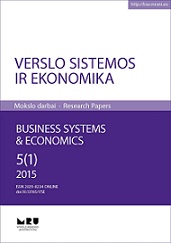FISKALINĖS POLITIKOS ĮTAKA PAJAMŲ NELYGYBEI EUROPOS SĄJUNGOS ŠALYSE NARĖSE
THE INFLUENCE OF FISCAL POLICY ON INCOME INEQUALITY IN EUROPEAN UNION’S MEMBER STATES
Author(s): Rodica CruduSubject(s): Economy
Published by: Mykolas Romeris University
Keywords: fiscal policy; direct taxes; income inequalities; gini coefficient; social contributions
Summary/Abstract: Poor growth performance over the past decades in Europe has increased concerns for rising income discrepancies and social exclusion. European authorities have recently launched the Europe 2020 strategy which aims to improve social inclusion in Europe on top of already existing European regional policies aiming to reduce regional disparities through stimulating growth in areas where incomes are relatively low. While it is most common to confine measures of inequality to national borders, the existence of such union-wide objectives and policies motivates measuring income dispersion among all Europeans in this paper. Fiscal policy is a powerful tool that changes the distribution of income in either direction, up or down. In this context, the present paper reviews the evolution of income inequality in EU member countries and figures out how fiscal policy (direct taxes) has influenced these outcomes. The paper also examines the contributions of both tax and expenditure policies in reducing income inequality in the EU, highlighting fiscal policy’s impact in different EU member countries.
Journal: Business Systems & Economics
- Issue Year: 2015
- Issue No: 1
- Page Range: 46-60
- Page Count: 15

